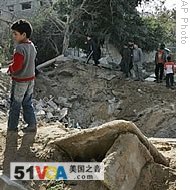Washington
17 January 2009
Rocket attacks on Israeli cities by Hamas and Israel's invasion of densely-populated Gaza are raising questions about whether both sides are committing war crimes. Palestinian officials say more than 1,000 people have been killed in Gaza, half of them women and children. But the situation is complicated, with experts accusing both sides of unnecessarily putting civilians in danger.
Civilian casualties in war are nothing new, but combatants have a responsibility to avoid them as much as possible. Clearly, that does not always happen.
"Where you have war, you have war crimes. And the only question is how many, how frequent and how serious," said attorney Jonathan Drimmer, who is a specialist in international law and teaches at Georgetown University. "Hamas seems to be using human shields. Israel seems to be taking the bait. Whether they are doing so in a way that violates the laws of war is a little bit less clear."
 |
| An Israeli woman, suffering from shock, is helped by a soldier after a rocket fired from the Gaza Strip hit the southern town of Sderot, 11 Jan. 2009 |
"Israel is operating in Gaza in accordance with international law," he said. "We are making every effort to avoid harming Palestinian civilians. But at the same time we can not be expected sit back and just receive a barrage of thousands of rockets on our people just because they are shooting out of civilian population [areas] in Gaza and holding 1.5 million Gazans as hostage."
Despite numerous attempts by VOA, the Hamas spokesman in Beirut was not available to comment, but at the Palestinian mission in Washington, chief representative Nabil Abuznaid disputed the Israeli claim.
 |
| Palestinians gather around a crater caused by an Israeli strike, at the damaged Sheik Radwan cemetery, following Israeli military operations in Gaza City, 14 Jan 2009 |
Abuznaid says Hamas should stop its rocket attacks on Israel, but he also says the Israeli military response and continuing occupation of the West Bank only make matters worse.
"This occupation creates Hamas," he said. "This occupation creates radicalism. This occupation recruits suicide bombers. Let us move peace forward. This is the answer to radicalism."
Addressing the broader Israeli-Palestinian dispute will have to wait at least until the fighting stops, and probably until after the Israeli election in February and the formation of a new government. Meanwhile, experts like Anthony Dworkin of the Crimes of War Project say civilians are suffering.
"My own feeling is that there is quite strong evidence that violations of the law may be taking place on both sides," he said.
Experts says Hamas' violations are clear and it does not even pretend to respect the difference between combatants and non-combatants. It openly fires rockets at civilian areas. It sends out suicide bombers. And it puts its own military installations in civilian areas, inviting Israeli attacks that could harm the civilians. But Dworkin says that does not remove Israel's responsibility to use all its capabilities to prevent harm to civilians, and to choose not to exercise its right to respond in some cases.
"If the harm to civilians of a particular attack is going to be excessive compared to the military advantage of undertaking that particular attack, then you have to call it off," he said. "You cannot do it. And that is what is called the Rule of Proportionality."
But the experts say with all foreign journalists and most foreign relief and human rights workers kept out of Gaza in recent weeks, it is impossible to know exactly what each side is doing. They say, like in many conflicts, all the facts will not come out until later, and they do not expect either side to hold their own people accountable for any war crimes.
Anthony Dworkin has a different suggestion.
"To some degree, I think, international legitimacy should depend on your complying with these rules, which are, after all, the essential rules of humanity, when it comes to armed conflict," he said.
Dworkin says countries should make support for Israel or Hamas conditional on their respect for civilians as they continue their conflict.